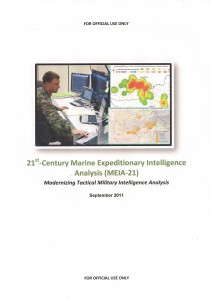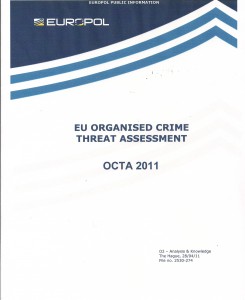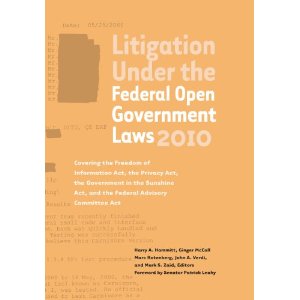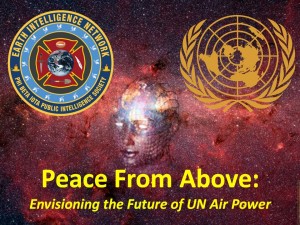
2011 USMC Expeditionary Analytics PDF
Online Source of Above Safety Copy
See Also:

2011 USMC Expeditionary Analytics PDF
Online Source of Above Safety Copy
See Also:

Organised crime is changing and becoming increasingly diverse in its methods, group structures, and impact on society, reveals Europol’s 2011 Organised Crime Threat Assessment (OCTA), published today.
The bi–annual report, which assesses current and expected trends in organised crime affecting the European Union, explores how a new criminal landscape is emerging, marked increasingly by highly mobile and flexible groups operating in multiple jurisdictions and criminal sectors.
The report highlights the fact that criminal groups are increasingly multi–commodity and poly–criminal in their activities, gathering diverse portfolios of criminal business interests, improving their resilience at a time of economic austerity and strengthening their capability to identify and exploit new illicit markets. Activities such as carbon credit fraud, payment card fraud and commodity counterfeiting attract increasing interest due to a lower level of perceived risk.
Summary of the Report (Full Report Below)
EU Organised Crime Threat Assessment: OCTA 2011
Phi Beta Iota: This is the executive summary paragraph that resonates with us:
All prior RECAPs plus Series CLOSED below the line. Updated 2 August 2013.

Electronic Privacy Information Center (Author), Marc Rotenberg (Editor), Harry A. Hammitt (Editor), Ginger McCall (Editor), John A. Verdi (Editor), Mark S. Zaid (Editor)
I'm exploring a major campaign to expose illegal actions across the Defense Office of Hearings and Appeals and the Defense Intelligence Agency in particular, and in talking to the Electronic Privacy Information Center (EPIC) leadership got a chance to understand just how vital and USEFUL this guide is.
Senator Patrick Leahy, co-sponsor of the OPEN Government Act of 2007, and many others are on record as considering this the single most indispensable tool in any citizen's toolkit.
For myself, having seen the capricious, arbitrary, and often unethical and even abusive manner in which DIA Personnel “cooks the books” and manipulates job announcements and screening decisions, and having been personally privy to enormous abuse by the Director of the Defense Office of Hearings and Appeals and a specifc group of his subordinates, consider this manual essential to my own search for justice.
Although I will use it more to inform myself so I can assist the specialist lawyers in making the most of what I know in their probing inquires at DIA and DOHA, I certainly recommend it to any citizen that has a specific concern that is not getting a fair hearing.
I also recommend the publisher and experts that put it together, the Electronic Privacy Information Center (EPIC). Many folks do not realize that they have been one of the leading champions of open government, and have also been one of the leading champions in exposing fraud, waste, and abuse that has been concealed by secrecy.
The US Government, in my view, as a general observation, is out of control and no longer representative of We the People. This is the handbook for citizens to use in holding every branch of the federal government accountable for its misbehavior and its dereliction of duty in failing to represent the public interest as opposed to the interest of its very big stakeholders who are recipients of the tax dollar rather than contributors to the treasury of the Republic.
Arm yourself with this knowledge, and go into battle confident in the righteousness of your cause.
See Also [Amazon book link still broken]:
Piercing the Veil of Secrecy: Litigation Against U.S. Intelligence by Janine Brookner

Updated 2017.
SHORT URL: http://tinyurl.com/Steele-Revolution
NEW FIGHT BACK: Electoral Reform via OpenPower
Phi Beta Iota: To those who have been leveraging the below, thank you for your interest. It seemed like a good idea to go ahead and post a version of the chart showing in red all of the pre-conditions of revolution in the USA that are now actively present. The failure of leadership to manifest ethics and to nurture education is particularly harmful–white collar criminals do not prosper when the political leadership is ethical and upholds its responsibility to protect the public interest. The ONLY thing–the one RIGHT thing–that needs to be done to make everything else possible is Electoral Reform (1 Page, 9 Points). If the various parties and committees and alliances claiming to represent the public interest fail to sponsor this one simple fix, they reveal themselves for what they are: partisan quasi-criminal organizations operating in betrayal of the public trust, with no interest in restoring America the Republic, America the Beautiful.
EDIT: For those who really do not understand the integrity of the above in today's context, we will make this explicit:
1. The country has been run into the ground–the bottom 98% have had their seed corn stolen and eaten by the top 2%. There is no going back, neither revenge nor expropriation will do. What has been done is done, get over it.
2. There isn't a leader or leadership team or party or “elite” network on the planet that can put the USA back together again [except perhaps We the People Reform Coalition].
3. HOWEVER, “bottom up” collective intelligence is agile, intuitive, ethical in the aggregate, and so on. This is REALLY SIMPLE: restore the integrity of the electoral system (local to national) and get out of the way. This is called Epoch B Leadership. It is also the root “good” of Advanced Information Operations You start by empowering your own public and not lying to them.
Graphic: Pre-Conditions of Revolution
Graphic: Revolution Model Simplified
2011 Thinking About Revolution
Review: Revolutions and Revolutionary Movements
Search: rm maciver the web of government summary
Search: smart nation intelligence reform electoral reform national security reform

Short URL: http://tinyurl.com/UNODIN
Steele in Dorn Peace from Above As Published
Finally published in 2014 (Article) originally presented in 2011 (Briefing).
The chapter more fully integrates the DNI spiral between modern mature intelligence (M4IS2) and modern mature Air Power.
Briefing 3.3 (29 Slides With Notes As Presented 40 KB pptx)
Event: 15-17 June Ontario UN Aerospace Power
See Also:
2012 Robert Steele: Practical Reflections on UN Intelligence + UN RECAP
UN Intelligence @ Phi Beta Iota
Worth a Look: Wings for Peace – First Book on Air Power in UN Operations

Dear friends,
I have worked for several months to develop the ideas in this article and to articulate them in an accessible way. They are fundamental understandings underlying the co-intelligence vision of a wiser democracy.
If the ideas intrigue you, you can find a longer version with more detailed guidelines and references online. I wrote the abstract below to make it easier for you to see the whole pattern at once. I hope you find both versions interesting and useful.
Coheartedly,
Tom
============
GUIDELINES FOR MAKING WISER DECISIONS ON PUBLIC ISSUES
by Tom Atlee
As a civilization we have tremendous collective power, but we don't always use it wisely. We can make good decisions, but we face messy, entangled, rapidly growing problems with complex, debatable causes. Efforts to solve one problem often generate new ones. We need more than problem-solving smarts here. We need wisdom.
A good definition for wisdom here is
the capacity to take into account
what needs to be taken into account
to produce long term, inclusive benefits.
To the extent we fail to take something important into account, it will come back to haunt us. But often we only realize we overlooked something long after our decision has been implemented. Certain practices – because they lead us to include more of what's important – can help us meet this challenge. Here are eight complementary ways to do this. The more of them we do, and the better we do them, the wiser our collective decisions will be.
Continue reading “Tom Atlee: Making Wise Decisions on Public Issues”